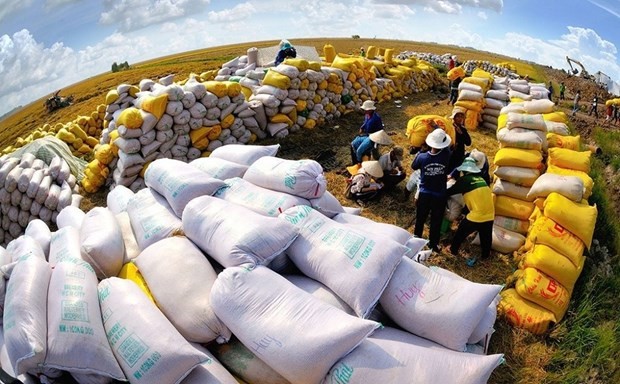
Exports add tens of billions of USD to coffers thanks to FTAs
Latest
 |
| Vietnamese rice products are benefiting from free trade agreements. (Photo: VNA) |
Vietnam’s exports have gained tens of billions of USD each year from free trade agreements (FTAs) that Vietnam is a signatory, the Ministry of Industry and Trade (MoIT) revealed.
Statistics of the General Department of Customs showed that after nearly three years since the EU-Vietnam Free Trade Agreement (EVFTA) took effect, export turnover from Vietnam to the EU has experienced tremendous growth, with 14.2% in 2021 and 16.7% in 2022.
According to a survey on FTAs in Vietnam published earlier by the Center for WTO and Integration under the Vietnam Chamber of Commerce and Industry (VCCI), nearly 41% of Vietnamese enterprises said that they have enjoyed at least some benefits from the deal.
Of which, the most common benefits are from preferential tariffs for import and export goods and positive effects in increasing orders, revenue, and profit.
According to the VCCI, currently markets that have signed FTAs with Vietnam still have many barriers, especially in terms of technical standards. However, in the long run, the agreements will still be effective when the economy is prosperous and consumption demand in the market recovers.
According to the MoIT, Vietnam has now signed and implemented many new generation FTAs, and a free trade agreement with the first partner in West Asia, Israel, has also been signed, offering the opportunity to reduce up to 92% of tariff lines for Vietnamese goods to this country.
However, Vietnam's agricultural products entering the EU recently have not achieved the expected growth rate. The main reason is the prolonged Covid-19 epidemic, followed by the conflict in Ukraine. These events are causing countries to enter an economic recession, having to tighten spending, while a series of key Vietnamese goods such as marine products, furniture, cashew nuts, and rubber are in a difficult situation because of inflation. However, many enterprises have eyed orders from different markets, including Africa.
Nguyen Ngoc Luan, CEO of fruit coffee chain Meet More said that incentives on tax reduction have helped Vietnamese enterprises have more opportunities to increase exports but major markets are facing difficulties this year due to the recession affected by the prolonged war.
Many businesses have been affected as purchasing power has dropped sharply from the US, Australia, Russia and the EU. Currently, many businesses have signed contracts to export to Africa, but it is difficult to offset the decline from other markets.
Vietnam's vegetable and fruit exports to the EU market have faced the same situation. The EVFTA helps Vietnam eliminate up to 94% of tax lines for vegetables and fruits (previously with a tax rate of 10-20%), creating a competitive advantage over Thailand and China.
The representative of the Vietnam Fruit and Vegetables Association also affirmed that the opportunity for Vietnamese fruits and vegetables in the European market is huge because the market size is up to 62 billion EUR, equivalent to 43% of the total trade value of fruits and vegetables worldwide. However, this year's fruit and vegetable export growth is mainly due to the increase of China while low growth has been seen in the countries that have signed FTAs with Vietnam
Luan shared that the trade agreements help reduce import tax rates, but cannot stimulate consumer demand when the market reduces purchases. Once customers do not buy, the tax reduction is not effective.
In order to take fully advantage of the FTAs, the Ministry of Industry and Trade proposed the Government consider setting aside its own capital to support enterprises to tap these agreements more effectively.
Accordingly, the State Bank of Vietnam together with ministries and agencies should work with commercial banks to deliver appropriate credit with preferential interest rates to support businesses that want to improve production capacity.
At the same time, enterprises themselves also need to increase access to “green” credit sources, in order to promptly meet increasing standards from export markets.





















